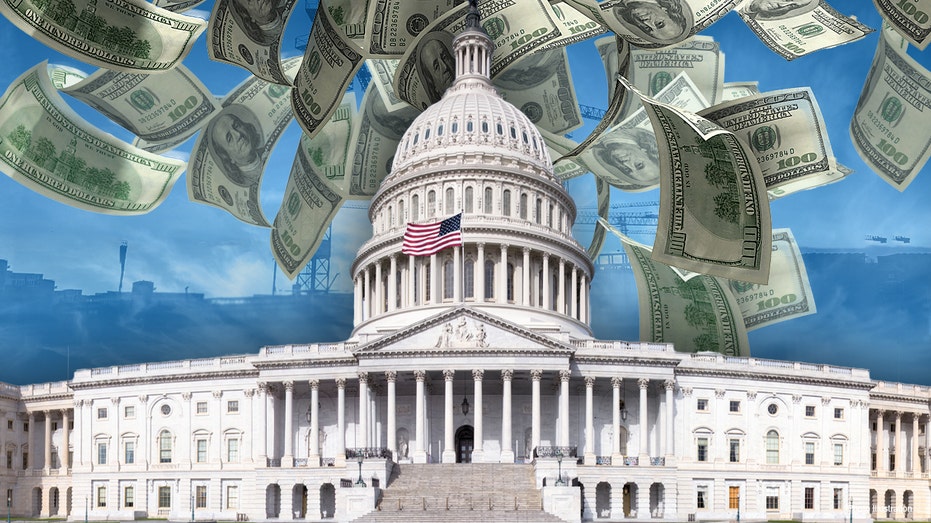The nonpartisan Congressional Budget Office (CBO) released a report on Wednesday that projected the national debt will rise to unprecedented levels over the next 30 years despite recent deficit reduction efforts and an improved outlook for economic growth.
The CBO’s projections show the share of federal debt held by the public – a key metric used by economists to track the size of the national debt – rising from 99% of gross domestic product (GDP) in 2024 to 166% of GDP in 2054.
That level of debt held by the public is nearly three times the 1994 to 2023 average of 58% of GDP. It would also far surpass the current record high of 106% of GDP which was set in 1946 when the U.S. was in the process of demobilization after the conclusion of World War II. The CBO projects the debt held by the public will break that record in 2029, reaching 107% of GDP.
Annual budget deficits are expected to continue to increase, driven primarily by a combination of rising interest costs due to the growing national debt and higher interest rates, as well as growth in spending on Medicare and Social Security rising due to health care cost growth and aging of the population.
US NATIONAL DEBT TRACKER FOR MARCH 21, 2024: SEE WHAT AMERICAN TAXPAYERS (YOU) OWE IN REAL TIME
Deficits are projected to steadily widen from 5.6% of GDP in 2024 to 8.5% in 2054. Federal tax revenues as a percentage of GDP are forecast at 17.5% in 2024 and would gradually increase to 18.8% in 2054.
However, that revenue growth is outpaced by spending rising from 23.1% of GDP to 27.3% in the CBO’s projections over that period. Between 1974 and 2023, revenues averaged 17.3% while spending averaged 21%.
The CBO projected that interest payments on the debt would rise from 3.1% of GDP to 6.3% in 2054. Spending on Medicare and other major health programs would increase from 5.8% to 8.3% in that period, while Social Security expenditures would increase from 5.0% to 5.9%.
SOARING DEFICITS TO PUSH PUBLICLY HELD DEBT TO RECORD LEVEL IN 4 YEARS
Among the changes the CBO noted from its last long-term projection in June were that the deficit and debt are projected to grow more slowly. The deficit is projected to be 1.6 percentage points smaller in 2053 than it was a year ago, while the debt is forecast to be 17 percentage points lower at that time.
Those changes are due to the bipartisan deficit reduction efforts in last year’s Fiscal Responsibility Act, which included discretionary spending caps the CBO called a “key factor contributing to smaller projected deficits.”

MONETARY, FISCAL POLICY DIVIDE POSE RISKS: NABE
The CBO’s report also forecasted slightly faster economic growth over the next 30 years than it projected in last year’s analysis. It projected an annual average real GDP growth rate of 2.1% over the 2024-2033 period – better than the 1.8% projected a year ago – and it averages 1.6% for the 2034-2053 period, up from 1.5% in the prior forecast.
“That increase stems from stronger growth of the potential labor force over the next 10 years, largely driven by increased net immigration and faster capital accumulation over the next 30 years,” the CBO wrote.
CBO REPORT SAYS US DEFICIT TO SKYROCKET IN NEXT DECADE

Despite the modest deficit reduction efforts and slightly faster economic growth, budget hawks say the overall fiscal outlook is dire and that lawmakers need to take action to put the federal budget on a sustainable path to stabilize the national debt.
“This is yet another reminder that politicians put political priorities ahead of the long-term health of the country,” said Maya MacGuineas, president of the nonpartisan Committee for a Responsible Federal Budget. “There is no way to look at these eye-popping numbers without realizing we need to make a change. And yet we have lawmakers promising what they won’t do: I won’t raise taxes, I won’t fix Social Security, I won’t pay for all the things I do want to do. And so we continue on this dangerous path.”
“For years, we’ve heard that our fiscal problems could be dealt with in the future before they get out of hand. Well, the future is now. Under the next presidential term, debt will hit a record share of the economy, interest costs will surge, and major trust funds will approach insolvency,” she added. “If this isn’t an alarm bell, it’s hard to think of what would be.”












